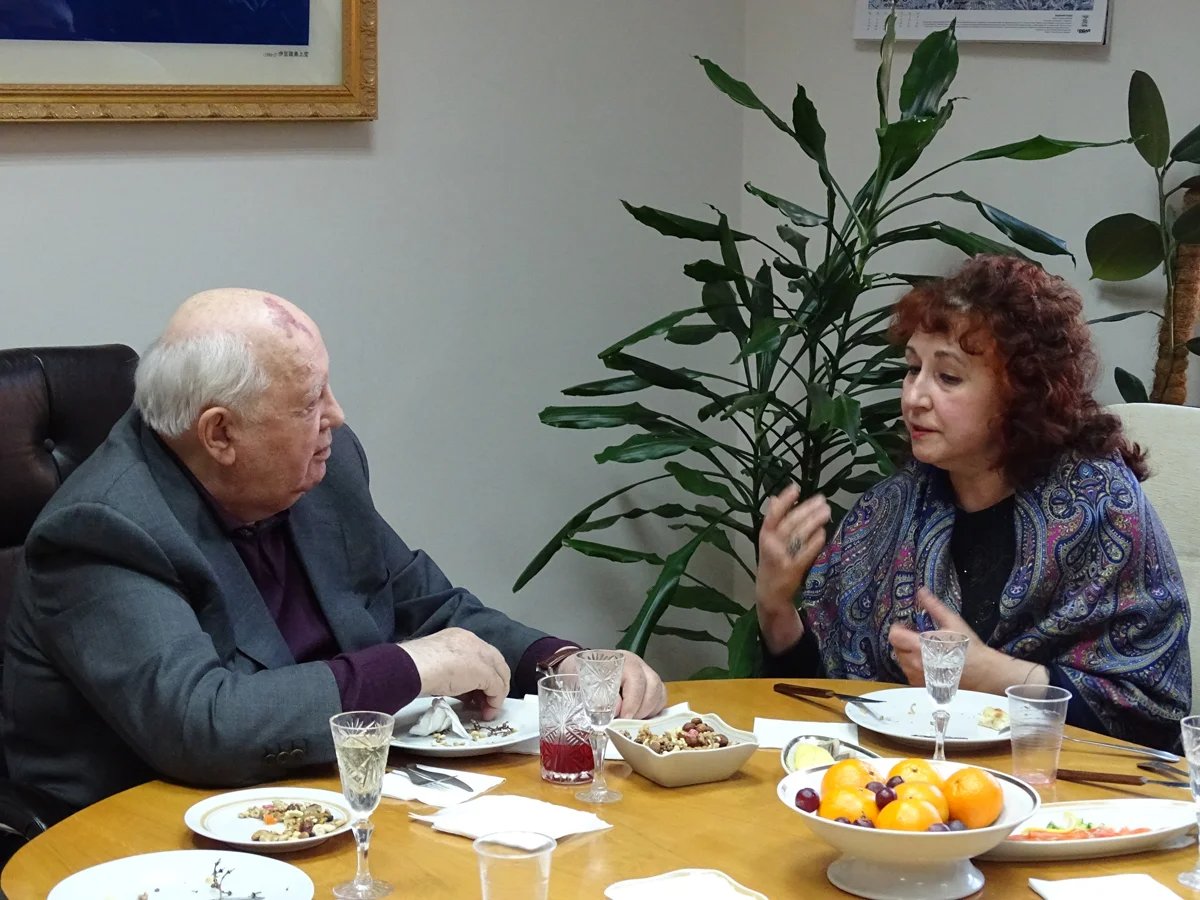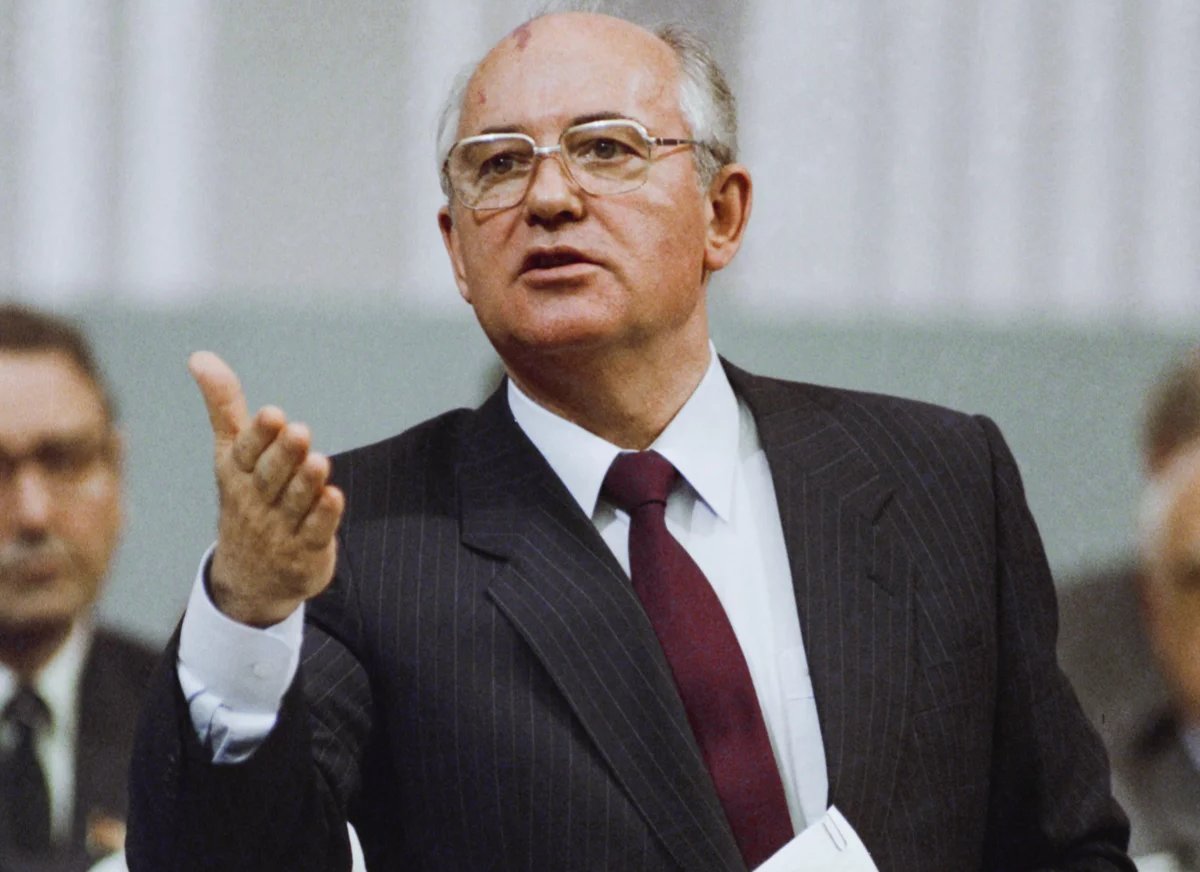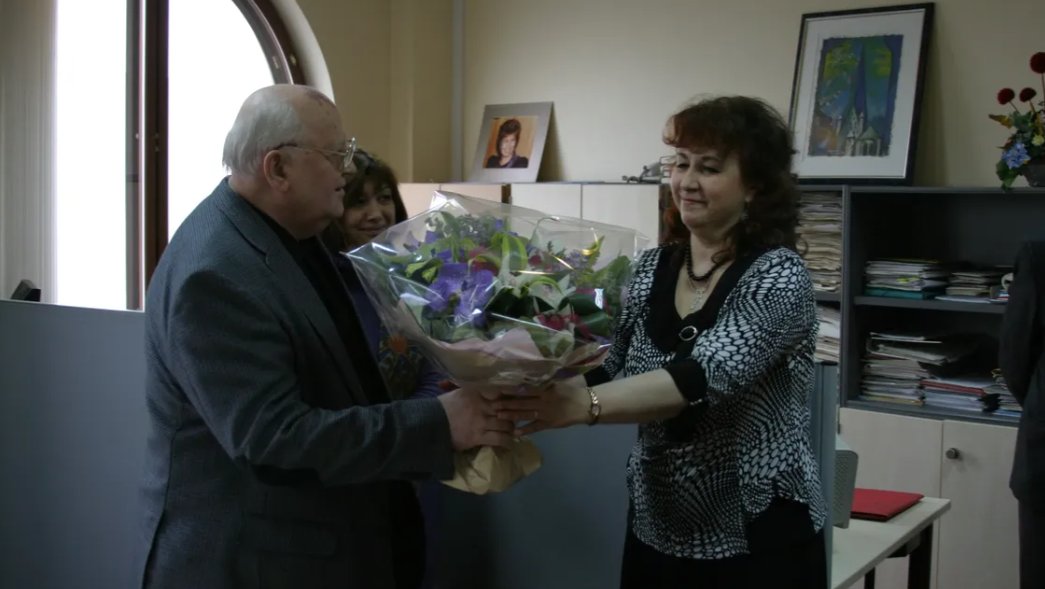Mikhail Gorbachev, the first and last president of the Soviet Union, would have celebrated his 92nd birthday on 2 March. Novaya Gazeta’s Leonid Nikitinsky asked Irina Vagina, who worked as his stenographer for many years, what it was like working for Gorbachev and what memories she has of him.
This interview was originally published on the Novaya.media website (project of Novaya Gazeta). We thank our colleagues for the opportunity to publish its translation.
Irina, you never shared any stories about Mikhail Gorbachev even though you were one of the closest people to him. Spatially, at least. Why is that?
Well, my profession is not very public, a stenographer. But later my position got a more respectable ring to it: assistant of the Secretariat of the General Secretary of the Communist Party of the Soviet Union. When I got the job in 1983, we were warned to dress modestly and not blabber too much. We were also under scrutiny — we often had to work with confidential documents.
How did you get into the Central Committee [of the Communist Party of the Soviet Union]? You probably couldn’t just make your way there with no credentials?
No, of course not. We were tested for a while, around two months. I had great qualifications: I went to a typography and stenography school, then graduated from a special stenography course and then from the editorial faculty of the Polygraph Institute without any breaks from work. Before the Central Committee, I worked in the Communist magazine for six years, my mother’s friend got me the job.
How did you join Gorbachev’s team?
When Gorbachev was elected General Secretary, he revamped his office, and they needed typographers and stenographers. It was a very individual thing: you need to get used to the dictation manner and discern the handwriting.
He probably also liked you for your modesty.
I don’t know… he was a modest person himself even though he constantly made jokes and even sang folk rhymes. Sometimes racy ones. But not in an offensive way, it was to unwind.
He sometimes would dictate texts for five hours even though stenographers should switch every 15 minutes. When I started working with him, I began eating very fast. My old friends were confused why that was. I barely noticed it myself and normally did not tell my friends where I worked, so it was hard to explain.
Was he forcing you to do that and did not give you any breaks?
He did not force me; it was just what he was like. Everything is on schedule, come on, come on!.. We just all got used to it while working with him. I injured my wrist a few times, it is a typical issue in our profession and for pianists… He could also call us at home to dictate something. But usually he did it himself, even at work: we had a direct phone line. Before, it was always through his secretary: “Patching through!..”, but when the secretary general himself began calling directly it was unusual. If he could not find me outside the working hours, then the security did.

Photo: the Gorbachev Foundation
Once, they brought me in from a barbecue on a Sunday, found me at a country house. We arrived, security guards were giving me nuts to chew because the fight against alcoholism was still going on, and Gorbachev had the whole politburo there. Gorbachev asked me, “Why are you so red in the face?” “It’s summer, I was tanning,” I replied. “Alright then,” he said, and we went straight to work. There was also a time when I went to tidy up [my relatives’] graves at a cemetery, the security reported about it to Gorbachev to which he responded with “Well, she won’t stay there, will she?..” Everyone was laughing so much. But this was during the Foundation days already.
So, he did overwork you?
Not me, the whole office. But we worked in three shifts with him, and he was alone, driven in at 10 AM and driven home at 10 PM. But we were all working in unison and did not notice any fatigue. I almost immediately found myself at the Kuntsevo Dacha (an official residence of Soviet leaders — translator’s note) in Volynskoye where the 27th Congress of the Communist Party of the Soviet Union report was drafted. There were so many state officials there… The same teams worked many times later in Novo-Ogaryovo and Zavidovo (other residences of Soviet leaders — translator’s note). It was such a merry-go-round; you can’t recall all of them.
They were probably arguing in the process, did you write it all down? I’d love to see it if these records are still there.
No, I don’t think so. They argued away from us, then everyone prepared their part and dictated them to us.
Gorbachev could arrive any time depending on his schedule but mostly in the evening. Then, everyone gathered again to read out their parts to him and argue. He encouraged it but said, “Speak out, but I will be the one to decide”. But they rarely argued with him.
Gorbachev then collected all parts and dictated his own version. He always internalised everything and never directly used other people’s texts.
Everyone has their own view of Gorbachev. Even those who never saw him. Meanwhile, many of those who worked for a while with him were later bitter with him. Why? For instance, [Alexander] Yakovlev (close ally of Gorbachev and intellectual architect of Perestroika and Glasnost — translator’s note) is quite critical about Gorbachev in his memoirs, while the name of [Valery] Boldin (Gorbachev’s chief of staff who was actively involved in the 1991 Soviet coup d’état attempt — translator’s note) speaks for itself.
I also don’t understand this. He addressed everyone informally, while they addressed him formally, but this is a party thing. He was always very professional and nice with us. But our work is technical, while their creative work always had a hint of jealousy. Later, when we worked in the Foundation, Gorbachev demanded that I lock myself in to decipher his latest variant and type it out so that no one can learn whose proposals he used as a basis ahead of time. And they all could not wait and were knocking on the door: “Irina, what are you doing there?.. Did Mr. Gorbachev give you an instruction?” “No, it was Raisa Maximovna [Gorbachev’s wife]”. I did tell him then, “Mr. Gorbachev, it’s not good, you are making me lie…”

Mikhail Gorbachev. Photo: Yuri Lizunov, Alexander Chumichev / TASS photo archives
And what did he say?
He’d say, “Well, what can you do, it’s our job”. Generally, the team has always been solid, and Yakovlev did come back to us later. Meanwhile, Boldin… It was just shocking. When Gorbachev returned from Foros (a holiday residence of Soviet leaders in Crimea where Gorbachev travelled to while the 1991 August coup conspirators were attempting to seize power — translator’s note) in 1991, he only asked about him: “How was Boldin acting?”
Tell me more, please. Where were you at the time? What were the others doing?
I was with him in Foros in 1990, while a different employee went with him there in 1991, she later left our team… Usually, aides and the whole office were sent on holiday along with Gorbachev but I stayed in the Kremlin that time. On 19 August, we were looking for Boldin, he was the Chief of Staff. But he just disappeared, and we did not know anything.
Special communications were cut right away, encrypted telegrams and other documents were no longer brought in, while some people from Gorbachev’s office stopped greeting me just in case. I was advised not to go to work since there was nothing to do anyway.
But I could not just leave my post. I was showing up at work, and demanded a car with a beacon light to deliver documents from the Kremlin to the Staraya Square (headquarters of the Central Committee of the Communist Party of the Soviet Union — translator’s note) for the aides who urgently returned to their posts… Tanks were all around, it was scary, what if we were arrested as well. It would not be wise to walk around with encrypted documents…
Gorbachev changed when he returned from Foros, did you notice anything?
No, you could see it in Raisa Gorbacheva’s behaviour, while Mikhail Gorbachev knew how to maintain composure, you could not see anything. And the merry-go-round went spinning again — it was the time of the Union Treaty, meeting after meeting, they would drive me into the Kremlin at 8 AM and take me back at 1 AM because nobody trusted anyone, and we still needed to print because there were no computers back then…
Did they start greeting you again at least?
Of course, just in case. But I did not tell Gorbachev anything about it, I am not that kind of person, and he only asked about Boldin. And what do I know about Boldin? He just disappeared and that’s it.
Did you work with Gorbachev until his last day in the Kremlin?
I was with him until the very last day, and later in the Foundation. On the last day in the Kremlin, when [Boris] Yeltsin came to demand the keys to the office earlier than promised, we were on the third floor with another employee and then these new employees came wheeling a cart with things out: notepads, pens, other small things, and Gorbachev’s boots. I broke down crying. You can’t do that…
Did he later also dictate you his books or did he write them himself?
He dictated them chapter by chapter, he was used to that, and then he corrected them. He initially travelled a lot, delivered lectures, and then ran for president in 1996… We went to the US; I think in 1994. We took electronic machines with us and a typewriter just in case because there is no way to plug in an electronic machine on the plane. We constantly flew here and back, we had just taken off and then it was time to land. Meanwhile, Gorbachev had time to dictate something to me but I still needed to type it out.
We travelled to the US Congress in Washington, no time to look for a table, so I just placed a typewriter on a chair and sat on the floor. The Americans said, “Wow, the Russian heroism!..”
When I entered the room, everyone started shaking my hand. They were asking to sell this typewriter but I said: no, it will go to the museum. This was when I was given my first laptop…
When we were dismissed, some people went on to work for commercial businesses. I was headhunted for Lukoil (Russian energy giant — translator’s note), the salary was five times higher there. I don’t know where Gorbachev learnt that, maybe just felt it. He was dictating and then suddenly stopped to ask: “Irina, are you also going to leave?..” I said: “No, I am not going.” I told Lukoil as well: “I won’t go look at anything, don’t call me again. I am not working for money.”
He spent a few years dictating to me his last book, edited it, and then dictated again. Sometimes with tears in his eyes when he was speaking about his wife Raisa.
When she died in 1999, he was calling us to work for three years straight on 8 March. He could not stay home alone. He only had a cat named Vilka living there for about 13 years.
Then, before the very end, he was hit by a car. But we did not tell Gorbachev. The cat is gone and that’s it, there was no point in making it sadder than it was.
Do you miss Gorbachev?
Of course. Initially, I saw him in my dreams almost every night. I was thinking about what that was, maybe he is having a bad time there.
But it is all good there already.
Well, I was thinking that he could see what is happening here in Russia, and it’s unlikely that he likes it. I was told to light a candle for him in church. I am not very religious but I did. He is no longer in my dreams. I hope he has found peace.
Leonid Nikitinskiy
Join us in rebuilding Novaya Gazeta Europe
The Russian government has banned independent media. We were forced to leave our country in order to keep doing our job, telling our readers about what is going on Russia, Ukraine and Europe.
We will continue fighting against warfare and dictatorship. We believe that freedom of speech is the most efficient antidote against tyranny. Support us financially to help us fight for peace and freedom.
By clicking the Support button, you agree to the processing of your personal data.
To cancel a regular donation, please write to [email protected]

